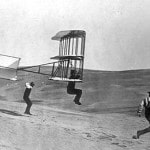
It has been a good week for human genetics, with high-profile studies published in Science (here) and NEJM (here, here, here), and a summit at the White House on Precision Medicine. Here, I summarize the published studies and put them in context for drug discovery. But first, I want to briefly detour into a story about the Wright Brothers.
[Disclaimer: I am a Merck/MSD employee. The opinions I am expressing are my own and do not necessarily represent the position of my employer.]
In 1900, Wilbur and Orville Wright first began experiments with their flying machine. They defined three problems for manned flight: power, wing structure and control. As described beautifully in David McCullough’s book (review here), the brothers focused on the latter, control, which when sufficiently solved led to the first manned flight in 1903. Within ten years of solving the “flying problem”, aviation technology progressed to the point that manned flights were routine.
By analogy, I would argue that there are three key challenges for drug discovery: targets, biomarkers and clinical proof-of-concept studies. The key problem to solve is target selection. Today, we do not know enough about causal human biology to select targets, and as a consequence we have a crisis in cost (drugs are too expensive to develop because of failures at the most costly stage, late development) and innovation (for those drugs that work, there is insufficient differentiation from standard-of-care treatments to change health care outcomes).…

